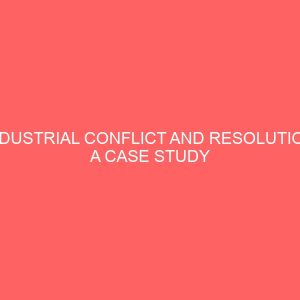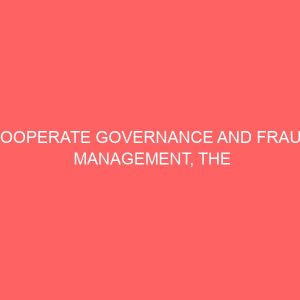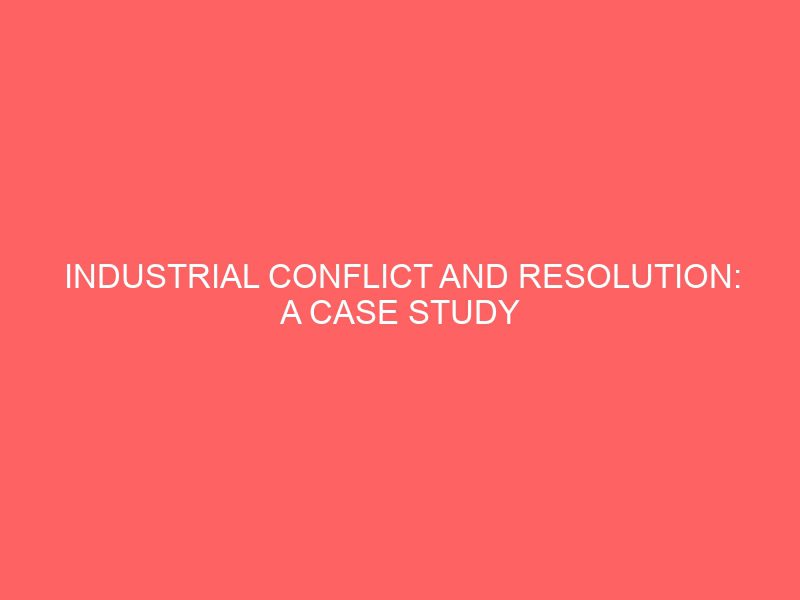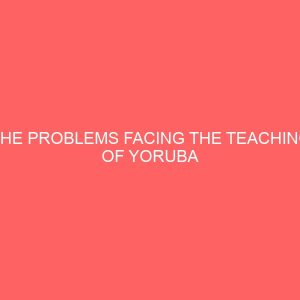Description
ABSTRACT
This study is an attempt to survey the trends happening in the Industrial Conflict and Resolution in public sector of the economy.
The objective of the investigation includes finding which group does industrial conflict and resolution belongs to in the Nigeria Trade Union and its implication on the Nigeria’s economy.
It also explained how conflicts are managed by the employers of labour.
The instrument used was questionnaires and oral interviews on the industrial conflict and resolution in public sector of economy.
Overall interview followed and the results offered the useful guide for the research.
Percentile method was used for research analysis.
CHAPTER ONE
1.1. Introduction
Industrial conflict is a national phenomenon and its occurrence in any sphere of endeavours when human beings are involved in meritable. We must accept dispute as an element in human life as well as in industrial environment. It is important to agree that conflict, labour and management are as natural as dispute between wife and husband, between parents and child, buyer and seller and of course between intimate friends.
One can say that conflict can be very healthy things at times, because after a resolution of such dispute there exist a cordial and mere friendly report between the parties involved in the dispute. Hence, our elders say that if we dont fight we cannot be friend.
If that concept of our elder is acceptable and universal in it applicability then it should not be the aims of any manager or employer to suppress or attempt to eliminate disputes. Such a goal is very unrealistic. However, conflict must be resolved as soon as it arises, it should not be allowed to mature and degenerate into strike or break down of law amp; order.
According to Ross Smyth, he says that conflict in organization is inevitable due to the nature and design of the structure itself.
1.2. Background of the Study
The Cocoa Research Institute of Nigeria CRIN as we know today was an offshoot of West African Cocoa Research Institute WACRI which was established in 1944 by the Colonial Administration purposely to combat the major problem of swollen shoot disease and mired pests of cocoa, a very important commercial crops in West Africa.
The crop was the main export and remained for a long time the major revenue earning product of the federation Nigeria. The Headquarters of WACRI was at TAFO in Ghana and substation was established at Moor Plantation Ibadan in 1953.
The growth of Nationalism and consequent upon the attainment of independence by Ghana and Nigeria in 1960, the WACRI was dissolved in October 1962. In order to further ascertain their freedom from colonialism, Nigeria established the Cocoa Research Institute of Nigeria by the act of parliament in 1964 RossSmyth, Personnel Journal, Sources and Resolution of Conflict in Management. Personnel JOurnal Vol. 56 No. 5 May, 1977, Pg. 226.
At its inception in 1964 it was popularly known as Ibadan Native Administration Cocoa farm established in the Gambari Forest Research covering about 800 acres. Today, the institute occupies about 4.5 square miles at GES maintains six 6 substations based on ecological zone. The substations are Uhomora in Edo State. Ochaja Kogi State Ikom Cross River State, Mambila Taraba State, Owena Ondo State, Ibeku Abia State.
The institute is saddled with the responsibility of conducting research into all aspects of cocoa, kola, coffee, cashew and tea which include the selection breeding and production of strain of 5 crops the establishment and the maintenance for the crop. The study of the soil chemistry in order to determine their nutritional requirement Bioecological studies or major insect, pests of the crops and their control studies on causes of mass sterility in the crops economics utilization of the crops and the dissemination of research findings.
During the early years of its inception the institute was attached to the Agriculture Research Council of Nigeria ARCN by a decree passed in 1973. It operated under the ARCN for only four years when the National Science and Technology Development Agency NSTDA was established in 1977 to oversee and coordinate research activities of all agricultural research institute in the federation.
Sequel to the military handling over to the Civilian Administration in 1979, there was the establishment of the Ministry of Science and Technology in 1979 at the Federal level which took over all the responsibilities of the NSTDA. Hence, all the Agricultural Research Institute, twenty nine in all, are being supervised, controlled and coordinated by the Federal Ministry of Science and Technology. But during Babangida regime, some of the Research Institute of Nigeria was one of the affected Research Institute for it belongs to tree crops Research Institute.
1.3. Statement of Conflict Problem
There are many reasons why a workplace conflicts is cause. It is paramount to note that people tend to disagreed once in a while and in some area not agreeing at all.
Ideology: People differed in deals as everybody has different ways of solving or deliberating on vital issues. In a workplace where people dont always agree on vital issues concerning the company, there is bound to be conflicts either within the management or between the employees and employers. If the conflict is not quickly resolved by them agreeing collectively on one ideology, it might lead to something else.
Economics: This aspect is a stronghold on the causes of workplace is economically down and the management wants to cut their coats according to their sizes by reducing the strength of the staff or cutting down their salaries. This may not go well with the workers and it may lead to workplace conflict between the workers and the management employer.
Political: In every workplace, there is always caucus group or people with the same ideal and interest. This tends to cause a workplace conflicts as they will not be supportive with one another if unfortunately their group is not at the helms of affairs at the top. There is bound to be disagreement and this may lead to workplace conflict.
Technology: With the advancement in the trend of technology in the world, every workplace is at test, expected to have modern machines to facilitate their work and to ease manual pressure. Workplace where this is not applicable, there is bond to be a workplace conflict between the employees and the employers.
1.4. Objectives of the Study
By an official gazette N0 993 of 28th June 1973, the workers union of Cocoa Research Institute of Nigeria was registered as a trade union outfit. Before this date, there was no trade union movement in the institute. The senior and junior staff formed themselves into separate unions called Senior Staff Association and the CRIN General workers union respectively.
Owing to that the structuring of Trade Unions in 1978, CRIN workers union was affiliated to the NonAcademic Staff Union of Educational and Associated Institute NASU while the Senior Staff joined the Association of Universities Teaching Hospitals Research Institutes and Associated Institution SSAUTHRAI.
Nevertheless, the unions were formed with the following objectives:
1 To cater for the interest and welfare of workers.
2 To improve the working conditions of their services through collective bargaining.
3 To protect their members against unfair treatment
4 To regulate terms of condition of employment.
5 To settle disputes between members and employers, between workers and members arrange amicable agreements whenever possible.
6 To improve the economic status of members through increase of wages and salaries.
7 To maintain and expand the security and survival capacity of members.
8 To increase skills and competence of union officers through appropriate educational programmes such as Industrial Resolution employed and attained in the course of workers agitations.
Today in Nigeria, there are twenty nine Research Institute with different Institutional objectives and systems of operation.
The Cocoa Research Institute of Nigeria has a management style that usually allows for disputes to degenerate into conflicts before taking any necessary steps to meet their workers demands. This has not shown a proper desire to cater for workers welfare.
Apart from this, social amenities that should be enjoyed by workers are not provided until the workers enter into deadlock action with management employers as against what is obtained in some other Research Institute where promotions, training facilities, social amenities and salaries are regular, regardless of her status as federal parastatal. Workers continue to work late into the night daily without adequate compensations in the management to consider worker demands in fairness of their right toward making positive changes. This will help the institute to develop its human resources requirement rapidly and allows attaining the state of competence within its institutional mandate.
1.5. Purpose of Study
The main purpose of study is to find out the effect of conflict and how it is being managed in our industrial sectors of the Nigeria economy.
1.6. Limitation of Study
Constraint has been the major problem in writing this project, however, the researcher therefore resulted in using the available time to collect relevant data, held oral interview and compiled research papers available to justify research work.
1.7. Operational Definition of Terms
I Collective Bargaining: This is the working as a unit in an agreement with obligation of both sides.
II Bargaining: This is an agreement with obligation of both sides.
III Conflict: This is disagreement in the industrial sectors of Nigeria economy.
IV Strike: This is the stoppage of work by the workers in protest
V Negotiation: This is a kind of peace talk between the workers and employers.
VI Communication: This is the interaction between the management and the workers message transmission
VII Dispute: This is the total disagreement by workers.
VIII Steward: This is the committees that are responsible for managing or settling disputes.








Reviews
There are no reviews yet.